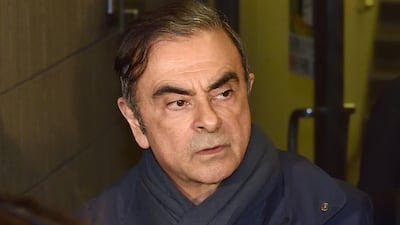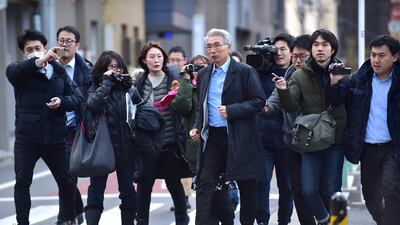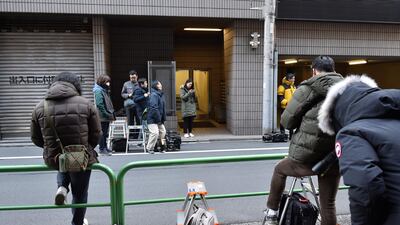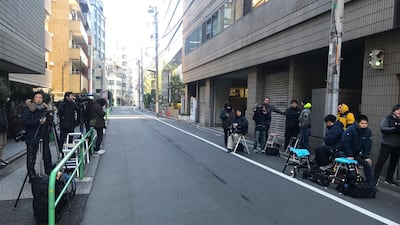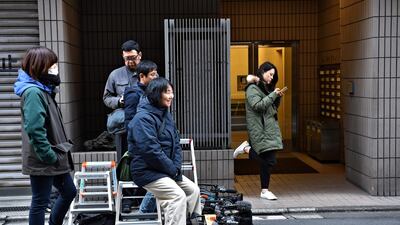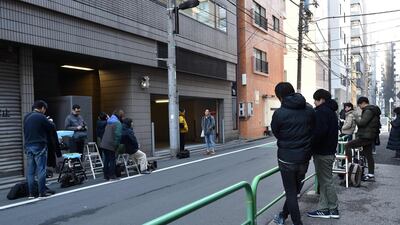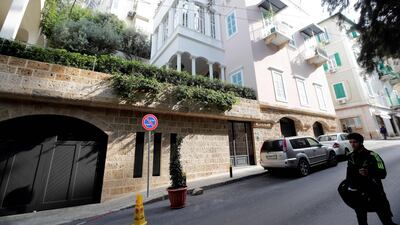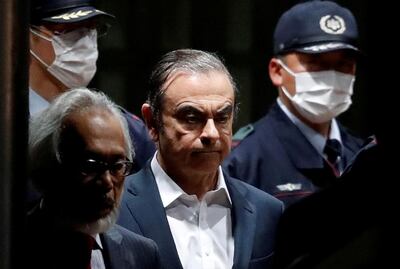Carlos Ghosn, the ousted boss of Renault-Nissan who is awaiting trial in Japan on financial misconduct charges, confirmed his arrival in Lebanon and said he refused to be held hostage by the Japanese justice system.
Mr Ghosn's surprise arrival by plane on Monday evening adds another twist to the ongoing saga that started with his arrest and subsequent long detention under Japanese laws.
“I am now in Lebanon and will no longer be held hostage by a rigged Japanese justice system where guilt is presumed, discrimination is rampant, and basic human rights are denied,” Mr Ghosn, 65, said in an emailed statement on Tuesday.
"I have not fled justice – I have escaped injustice and political persecution. I can now finally communicate freely with the media, and look forward to, starting next week."
It is unclear how Mr Ghosn managed to leave Japan, where his freedom of movement had been severely limited by the courts. He spent more than 100 days in detention after his arrest in 2018 but was allowed to move more freely more recently.
However, he had to seek permission from the court if he planned to stay away from home for more than two nights and was banned from travelling abroad, according to Japan's Kyodo news agency, which said that Mr Ghosn may have left the country without permission.
Mr Ghosn's French, Brazilian and Lebanese passports, held by his lawyers as part of his bail bond, could not have been used to escape Japan, one of his lawyers, Junichiro Hironaka, said in comments to reporters broadcast by Japan's NHK.
Mr Hironaka said Mr Ghosn's actions were "inexcusable" and he will tell the court that his team is in trouble and will provide the court with information it receives, NHK said.
.
The escape to Lebanon puts the former automotive titan in a country with no extradition agreement with Japan, Bloomberg reported.
The Financial Times said Mr Ghosn, who holds French and Lebanese citizenship, was no longer under house arrest, but said it did not know whether he had escaped or a deal had been reached.
The former Renault-Nissan boss landed at Beirut's Rafik Hariri International Airport, the paper said, quoting an associate of Mr Ghosn.
Ricardo Karam, a friend and Lebanese media figure confirmed in a message to The National that Mr Ghosn arrived on a private jet via Turkey. He at his home with wife Carole.
At Mr Ghosn’s house in an affluent Beirut neighbourhood on Tuesday, there were no security guards present and the windows were open. A shop owner across the street said he didn’t think Mr Ghosn was there, adding he didn’t know what had happened until he saw photographers outside the house, according to Bloomberg.
The Wall Street Journal quoted a source saying Mr Ghosn had fled Japan.
“Ghosn has turned into a fugitive from a suspect,” Koji Endo, an analyst at SBI Securities in Tokyo told Bloomberg. He’ll “probably never return to Japan”, and if he did, he would be arrested immediately.
A senior Lebanese foreign ministry source told Reuters Mr Ghosn entered Lebanon legally on a French passport and used his Lebanese ID with normal security procedures. Asked if Mr Ghosn used a French passport, the French foreign ministry press service said it had no immediate comment.
Immigration authorities had no record of Ghosn leaving the country, Japanese public broadcaster NHK said. A person resembling him entered Beirut international airport under a different name, NHK reported, citing an unidentified Lebanese security official.
The year-long saga began with his arrest at a Tokyo airport shortly after his private jet touched down on November 19, 2018.
He faces four charges that include hiding income and enriching himself through payments to dealerships in the Middle East.
Nissan sacked Mr Ghosn in April, saying its investigations revealed misconduct ranging from understating his salary while he was chief executive to transferring $5 million (Dh18.3m) of Nissan funds to an account in which he had an interest.
Mr Ghosn has repeatedly denied any wrongdoing since he was first detained. His lawyers said the charges against him were "politically motivated" and asked a court to dismiss the case.
Mr Ghosn claimed he had been stabbed in the back by his former colleagues at Nissan.
